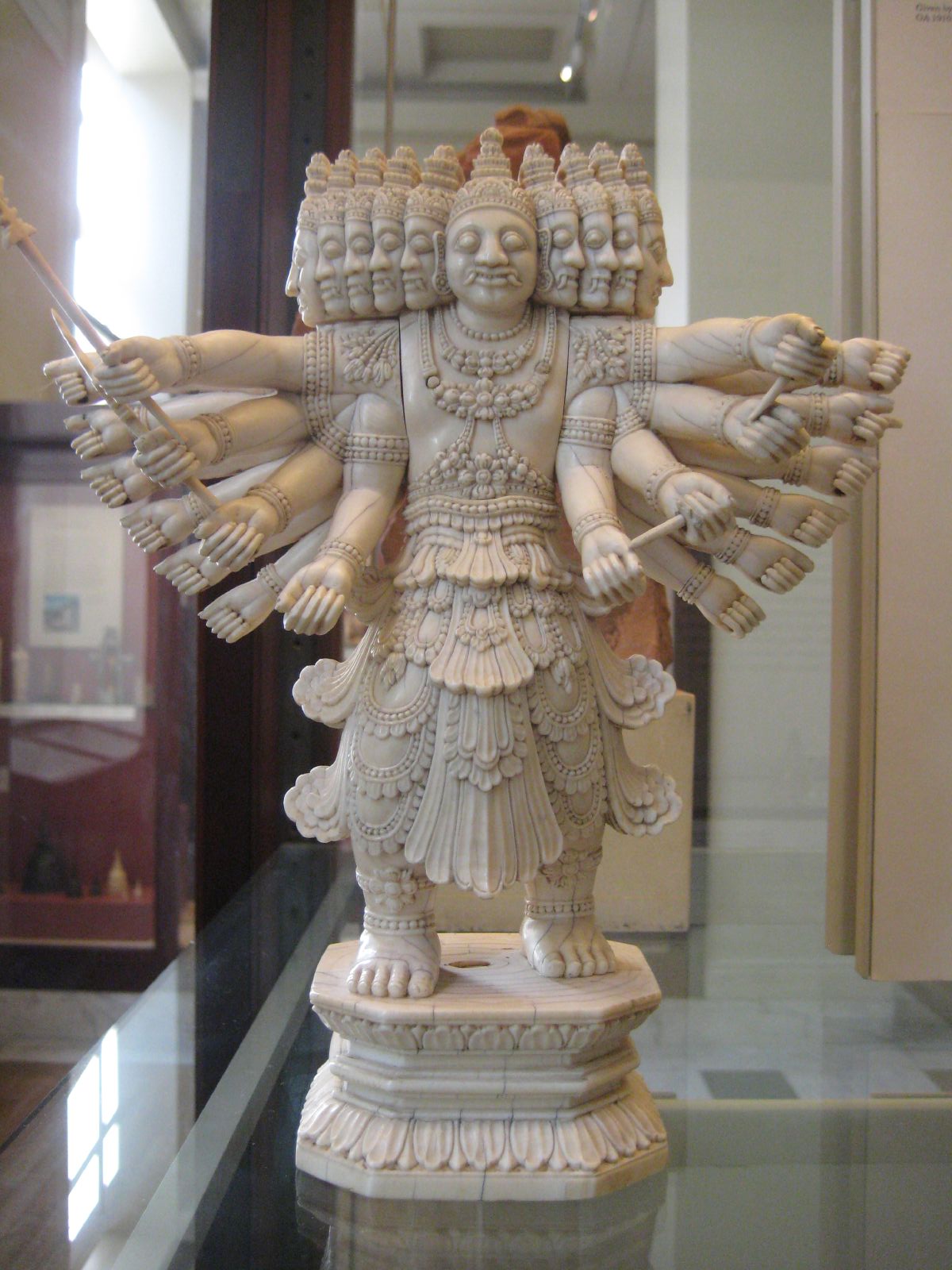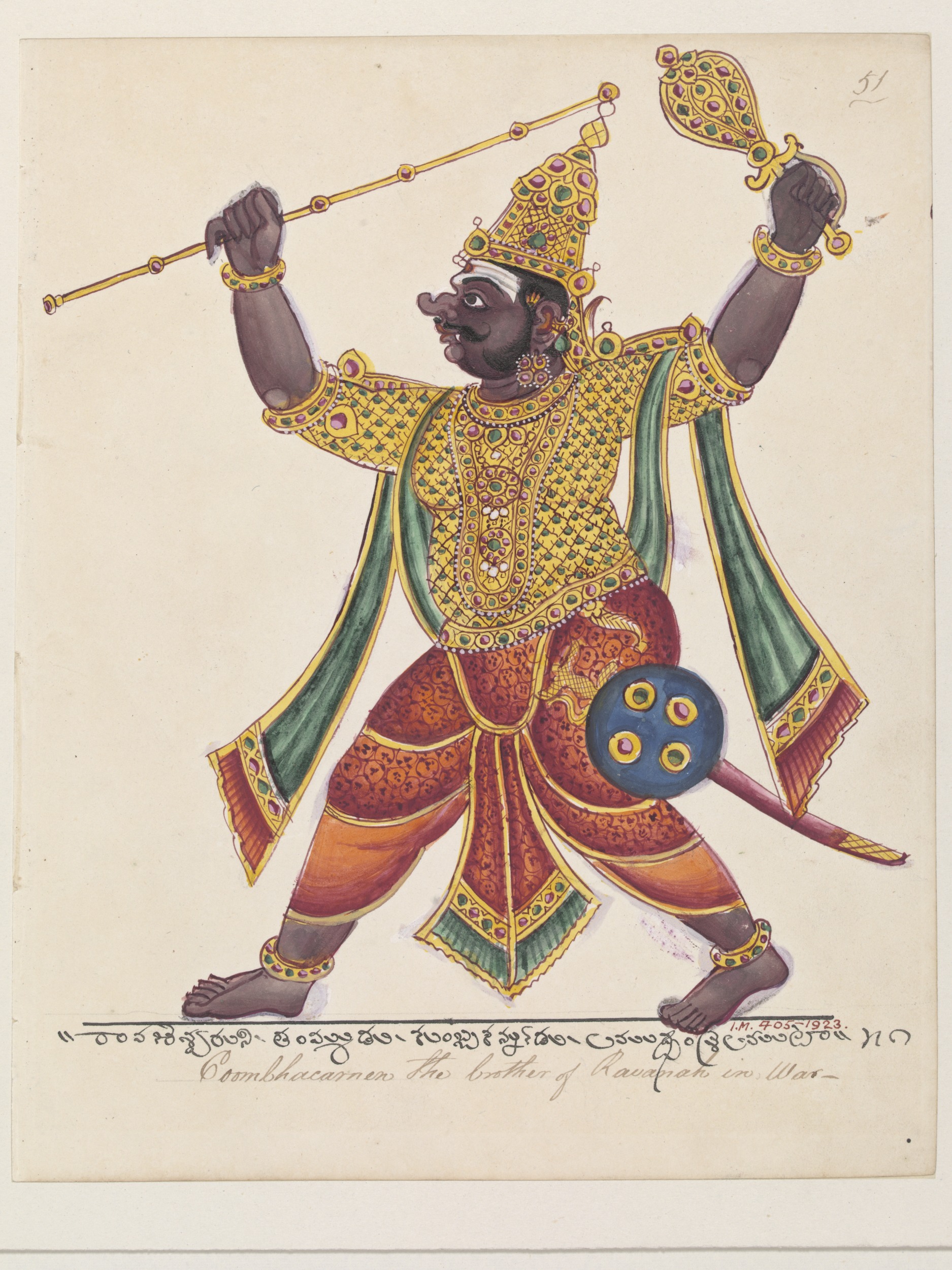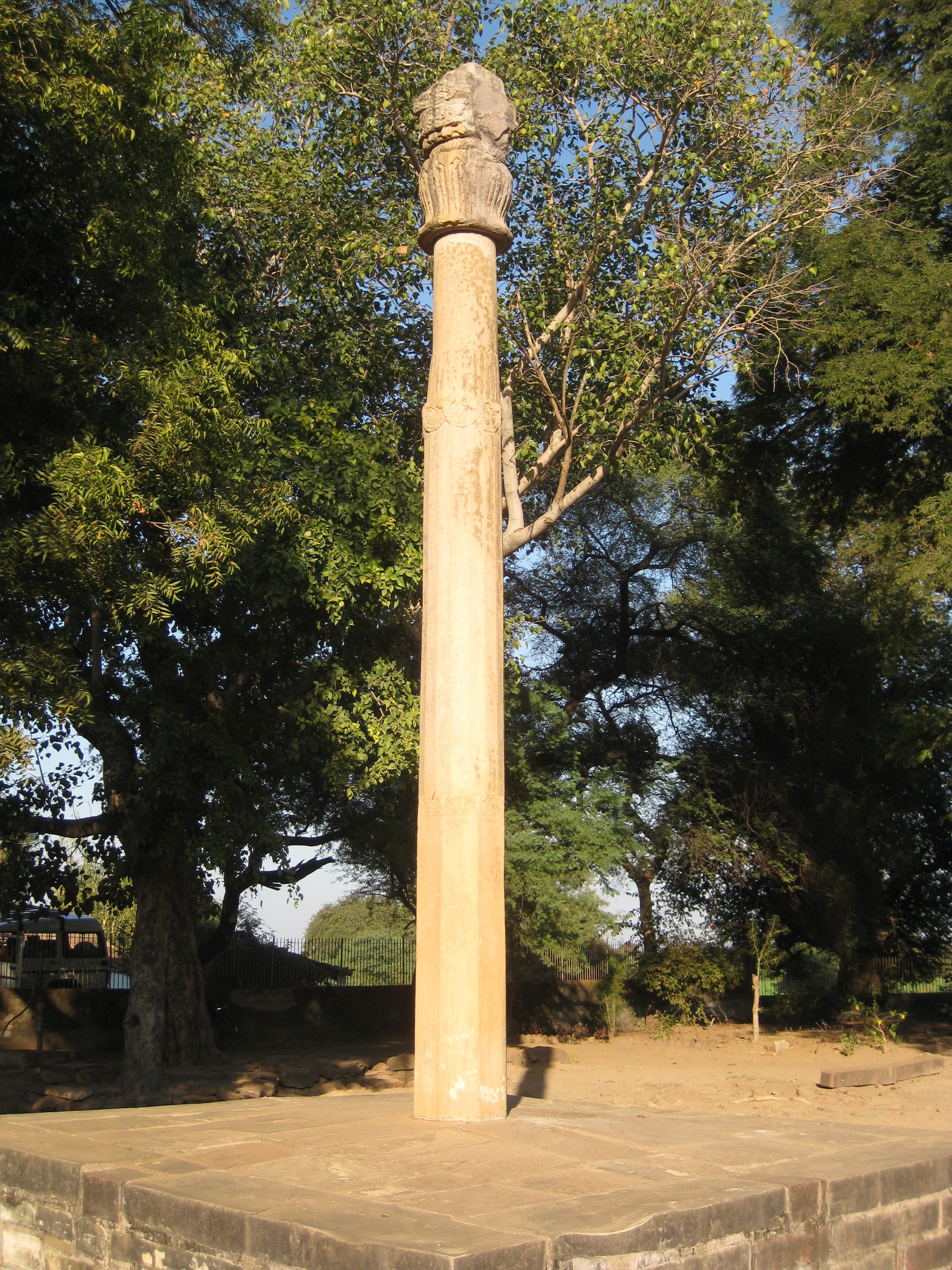|
Nikumbha
Nikumbha () is the name of multiple beings in Hindu mythology, a rakshasa and a danava. Legend Rakshasa Nikumbha Nikumbha, the rakshasa, is the son of Kumbhakarna and Vajramala. He is instructed by Kubera to watch over the Pisacas (a type of evil spirit). The Nilamata Purana refers to him as "the noble and strong lord of the Pisacas." Seeing Kumbha, his brother killed in battle, the enraged ran with an iron club towards the battle. Hanuman directly attacks Nikumbha, by striking his fist forcibly on Nikumbha’s chest. Unmoved by that blow, Nikumbha lifts Hanuman off the ground. Hanuman in retaliation frees himself and throws down Nikumbha on the ground. Hanuman descends on Nikumbha, pounds his chest with his fist, catches his head and tears it off. Thus, Nikumbha dies at the hands of Hanuman. Danava Nikumbha Nikumbha, the danava, appears in a story of Krishna, where the deity, his brother Balarama, along with the rest of the Yadava clan undertake a pilgrimage to a ... [...More Info...] [...Related Items...] OR: [Wikipedia] [Google] [Baidu] |
Kumbhakarna
Kumbhakarna (Sanskrit: कुम्भकर्ण, lit. ''pot-eared'') is a powerful rakshasa and younger brother of Ravana from the Hindu epic ''Ramayana''. Despite his gigantic size and appetite, he is described as a virtuous character and a great warrior in Hindu texts. He is said to have slaughtered 8,000 vanaras over the course of Rama's invasion of Lanka. Vibhishana narrated that Kumbhakarna had been born with immense strength, having subdued both Indra and Yama, striking the former in the chest with the broken tusk of Airavata. At the bequest of Indra, Brahma cursed the rakshasa to "sleep like he is dead". On Ravana's request, he commuted the curse to have the rakshasa sleep for six months at a time, and wake up for exactly one day to wreak havoc and devour to his heart's content. In a popular retelling of this tale, Kumbhakarna, accompanied by his brothers Ravana and Vibhishana, performed a major yajna to please Brahma. Indra was worried and jealous of his strength ... [...More Info...] [...Related Items...] OR: [Wikipedia] [Google] [Baidu] |
Danavas
In Hindu mythology, the danavas are a race descending from Kashyapa and his wife Danu, a daughter of the progenitor god, Daksha. It is mentioned that there are one hundred danavas. Origin The danavas are a mythological race of demigods, the half-brothers to the devas and daityas that are found in a range of Hindu texts. The danavas are a part of a larger group of the asuras, and are typically portrayed as opposed to the Hindu deities. However, historically, their role in Hinduism is varied and at times, the distinction between the danavas and Hindu deities is complex and they are difficult to distinguish from one another. Etymology The name ''danavas'' stems from the mother's name: Danu. Both danavas and Danu are derived from the Vedic word ''Da'' meaning 'to give.' Ananda Coomaraswamy suggests this word connotes generosity. Another interpretation of their name is associated with Danu's relationship with her first son (and demon), Vritra. In Indian mythology, in an atte ... [...More Info...] [...Related Items...] OR: [Wikipedia] [Google] [Baidu] |
Danava (Hinduism)
In Hindu mythology, the danavas are a race descending from Kashyapa and his wife Danu, a daughter of the progenitor god, Daksha. It is mentioned that there are one hundred danavas. Origin The danavas are a mythological race of demigods, the half-brothers to the devas and daityas that are found in a range of Hindu texts. The danavas are a part of a larger group of the asuras, and are typically portrayed as opposed to the Hindu deities. However, historically, their role in Hinduism is varied and at times, the distinction between the danavas and Hindu deities is complex and they are difficult to distinguish from one another. Etymology The name ''danavas'' stems from the mother's name: Danu. Both danavas and Danu are derived from the Vedic word ''Da'' meaning 'to give.' Ananda Coomaraswamy suggests this word connotes generosity. Another interpretation of their name is associated with Danu's relationship with her first son (and demon), Vritra. In Indian mythology, in an at ... [...More Info...] [...Related Items...] OR: [Wikipedia] [Google] [Baidu] |
Krishna
Krishna (; sa, कृष्ण ) is a major deity in Hinduism. He is worshipped as the eighth avatar of Vishnu and also as the Supreme god in his own right. He is the god of protection, compassion, tenderness, and love; and is one of the most popular and widely revered among Indian divinities. Krishna's birthday is celebrated every year by Hindus on Krishna Janmashtami according to the lunisolar Hindu calendar, which falls in late August or early September of the Gregorian calendar. The anecdotes and narratives of Krishna's life are generally titled as ''Krishna Leela''. He is a central character in the ''Mahabharata'', the '' Bhagavata Purana'', the ''Brahma Vaivarta Purana,'' and the '' Bhagavad Gita'', and is mentioned in many Hindu philosophical, theological, and mythological texts. They portray him in various perspectives: as a god-child, a prankster, a model lover, a divine hero, and the universal supreme being. Quote: "Krsna's various appearances as a di ... [...More Info...] [...Related Items...] OR: [Wikipedia] [Google] [Baidu] |
Rakshasa
Rakshasas ( sa, राक्षस, IAST: : Pali: ''rakkhaso'') lit. 'preservers' are a race of usually malevolent demigods prominently featured in Hindu mythology. According to the Brahmanda Purana, the rakshasas were created by Brahma when he assumed a body of ''tamas'' (darkness), the beings springing forth and promising to protect the waters of creation. They are often depicted to be man-eaters (''nri-chakshas'', ''kravyads''), acting as embodiments of the powers of evil in the Vedic scriptures. They are offered a distinction from yakshas, their cousins who are depicted to be forces of destruction. The term is also used to describe asuras, a class of power-seeking beings that oppose the benevolent devas. They are often depicted as antagonists in Hindu scriptures, as well as in Buddhism and Jainism. The female form of rakshasa is rakshasi. Hinduism In Vedas The Hymn 87 of the tenth mandala of the ''Rigveda'' mentions about Rakshasas. They are classified amongst the ... [...More Info...] [...Related Items...] OR: [Wikipedia] [Google] [Baidu] |
Rakshasa In The Ramayana
Rakshasas ( sa, राक्षस, IAST: : Pali: ''rakkhaso'') lit. 'preservers' are a race of usually malevolent demigods prominently featured in Hindu mythology. According to the Brahmanda Purana, the rakshasas were created by Brahma when he assumed a body of ''tamas'' (darkness), the beings springing forth and promising to protect the waters of creation. They are often depicted to be man-eaters (''nri-chakshas'', ''kravyads''), acting as embodiments of the powers of evil in the Vedic scriptures. They are offered a distinction from yakshas, their cousins who are depicted to be forces of destruction. The term is also used to describe asuras, a class of power-seeking beings that oppose the benevolent devas. They are often depicted as antagonists in Hindu scriptures, as well as in Buddhism and Jainism. The female form of rakshasa is rakshasi. Hinduism In Vedas The Hymn 87 of the tenth mandala of the ''Rigveda'' mentions about Rakshasas. They are classified amongst the ''Y ... [...More Info...] [...Related Items...] OR: [Wikipedia] [Google] [Baidu] |
Pradyumna
Pradyumna ( sa, प्रद्युम्न) is the eldest son of the Hindu deities Krishna and his chief consort, Rukmini. He is considered to be one of the four vyuha avatars of Vishnu. According to the Bhagavata Purana, Pradyumna was the rebirth of Kamadeva, the god of love. The Mahabharata states that Pradyumna was a portion of Sanat Kumara. The Harivamsa describes the chatur-vyuha, consisisting of the Vrishni heroes Vasudeva, Sankarsana, Pradyumna, and Aniruddha, that would later be the basis for the Vaishnava concept of primary quadrupled expansion, or avatara. Pradyumna is also a name of the Hindu god Vishnu, mentioned to be one of the 24 Keshava Namas (names). Birth and early life Pradyumna was the son of Krishna and the sixty-first grandson of Adinarayana. His mother was Rukmini, whom Krishna had eloped with from Vidarbha during her swayamvara on her request. Pradyumna was born in Dvaraka. He was the reincarnation of the demigod Kamadeva, the deity having pr ... [...More Info...] [...Related Items...] OR: [Wikipedia] [Google] [Baidu] |
Yadu Dynasty
Yaduvamsha () or Yādava Vaṃśa is a legendary dynasty featured in Hinduism, a cadet branch of the Chandravamsha dynasty. The dynasty's progenitor was Yadu, the eldest son of Emperor Yayati. Legend Origin In Hindu texts, the king Yayati was cursed by Sage Shukracharya with premature old age due to being unfaithful to his daughter, Devayani. According to a narrative found in the ''Mahabharata'', and the ''Vishnu Purana'', Yadu refused to exchange his years of youth with his father Yayati. So, he was removed from the king's line of succession, inheriting none of his domains. He was excluded from the Somavamsha, better known as Chandravamsha dynasty. Only the dynasty of King Puru, the youngest of the sons of Yayati was entitled to be known as Somavamsha, as Puru had obeyed his father. King Yadu ordered that the future children of Yadu would be known as Yadavas, and the dynasty would be known as ''Yaduvamsha''.Thapar, Romila (1978, reprint 1996). ''Ancient Indian Social His ... [...More Info...] [...Related Items...] OR: [Wikipedia] [Google] [Baidu] |
Balarama
Balarama (Sanskrit: बलराम, IAST: ''Balarāma'') is a Hindu god and the elder brother of Krishna. He is particularly significant in the Jagannath tradition, as one of the triad deities. He is also known as Haladhara, Halayudha, Baladeva, Balabhadra, and Sankarshana. The first two epithets associate him with ''hala'' (''langala'', "plough") from his strong associations with farming and farmers, as the deity who used farm equipment as weapons when needed, and the next two refer to his strength. Balarama is sometimes described as incarnation of Shesha, the serpent associated with the deity Vishnu; Krishna is regarded as an incarnation of Vishnu. Some traditions regard him as one of the 10 principal avatars of Vishnu himself. Balarama's significance in Indian culture has ancient roots. His image in artwork is dated to around the start of the common era, and in coins dated to the second-century BCE. In Jainism, he is known as Baladeva, and has been a historically signif ... [...More Info...] [...Related Items...] OR: [Wikipedia] [Google] [Baidu] |
Hindu Mythology
Hindu mythology is the body of myths and literature attributed to, and espoused by, the adherents of the Hindu religion, found in Hindu texts such as the Vedic literature, epics like ''Mahabharata'' and ''Ramayana'', the Puranas, and regional literature like the Tamil ''Periya Puranam'' and ''Divya Prabandham'', and the '' Mangal Kavya'' of Bengal. Hindu myths are also found in widely translated popular texts such as the fables of the '' Panchatantra'' and the ''Hitopadesha'', as well as in Southeast Asian texts. Primary sources * Vedas ** Rig ** Sama ** Yajur ** Atharva * Itihasa ** Ramayana ** Mahabharata * Maha-Puranas **Agni Purana **Brahma Purana ** Brahmanda Purana **Bhagavata Purana **Devi-Bhagavata Purana **Garuda Purana **Kurma Purana **Shiva Purana **Skanda Purana **Markandeya Purana **Matsya Purana ** Narada Purana **Linga Purana **Padma Purana **Varaha Purana **Vayu Purana **Vishnu Purana *Bengali literature **Mangal-Kāvya *Tamil literature ** Divya ... [...More Info...] [...Related Items...] OR: [Wikipedia] [Google] [Baidu] |
Krishna And Pradyumna
Krishna (; sa, कृष्ण ) is a major deity in Hinduism. He is worshipped as the eighth avatar of Vishnu and also as the Supreme god in his own right. He is the god of protection, compassion, tenderness, and love; and is one of the most popular and widely revered among Indian divinities. Krishna's birthday is celebrated every year by Hindus on Krishna Janmashtami according to the lunisolar Hindu calendar, which falls in late August or early September of the Gregorian calendar. The anecdotes and narratives of Krishna's life are generally titled as ''Krishna Leela''. He is a central character in the ''Mahabharata'', the ''Bhagavata Purana'', the ''Brahma Vaivarta Purana,'' and the '' Bhagavad Gita'', and is mentioned in many Hindu philosophical, theological, and mythological texts. They portray him in various perspectives: as a god-child, a prankster, a model lover, a divine hero, and the universal supreme being. Quote: "Krsna's various appearances as a divine ... [...More Info...] [...Related Items...] OR: [Wikipedia] [Google] [Baidu] |
Rakshasa
Rakshasas ( sa, राक्षस, IAST: : Pali: ''rakkhaso'') lit. 'preservers' are a race of usually malevolent demigods prominently featured in Hindu mythology. According to the Brahmanda Purana, the rakshasas were created by Brahma when he assumed a body of ''tamas'' (darkness), the beings springing forth and promising to protect the waters of creation. They are often depicted to be man-eaters (''nri-chakshas'', ''kravyads''), acting as embodiments of the powers of evil in the Vedic scriptures. They are offered a distinction from yakshas, their cousins who are depicted to be forces of destruction. The term is also used to describe asuras, a class of power-seeking beings that oppose the benevolent devas. They are often depicted as antagonists in Hindu scriptures, as well as in Buddhism and Jainism. The female form of rakshasa is rakshasi. Hinduism In Vedas The Hymn 87 of the tenth mandala of the ''Rigveda'' mentions about Rakshasas. They are classified amongst the ... [...More Info...] [...Related Items...] OR: [Wikipedia] [Google] [Baidu] |








